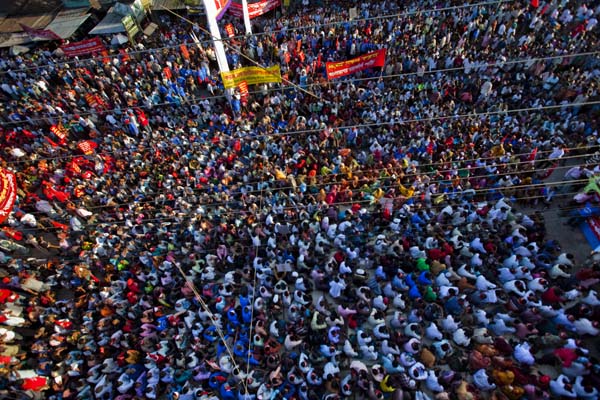Subscribe to ShahidulNews
People's Resistance to Global Capital and Government Collaboration is Vindicated
Rahnuma Ahmed
In reality, WikiLeaks leak of diplomatic cables from US Embassy, Dhaka reveal nothing new, they only serve to confirm what many of us across the world knew. But before writing about open-pit coal mining and Asia Energy's US$1.4 billion Phulbari project, I'd like to remind readers that in `Is there more to WikiLeaks than meets the eye?' I agreed with skeptics who thought Julian Assange, director of WikiLeaks, had been "compromised." That the "selective" nature of the data suggests WikiLeaks has possibly been "manipulated" by interested parties (New Age, Monday Dec 6, 2010). Since then, stronger reasons have emerged. WikiLeaks' enlistment of the "very architects of media disinformation"?The New York Times, the Guardian, der Spiegel?to "fight media disinformation" is suspect, writes professor Michel Chossudovsky (Dec 13, 2010). While Julie Levesque raises crucial questions about how the whistleblowing site and Assange "demand transparency" from governments and corporations around the world, but fail to provide basic information about their own organisation (Dec 20, 2010). However, notwithstanding this, given that the documents' authenticity are not denied by the White House, it is essential that we scrutinise them closely and "expose" the systems and structures of power (Andrew Gavin Marshall). That we expose US diplomacy as a cover for furthering imperial interests, that we expose national leaders as collaborators in this project. Further, that we vindicate those who have insisted that national development is often a cover for subjugating the nation's and peoples' interest. A mask which hides personal greed, and party ambitions. The list of those exposed is long: US ambassador James F Moriarty; American and British-owned companies (Asia Energy/Global Coal Management); prime minister Sheikh Hasina's energy advisor; members of parliament. But the cast of characters is much larger, they include ministers, bureaucrats, Petrobangla, BAPEX (Bangladesh Petroleum Exploration & Production Company), PDB (Power Development Board), major political parties, experts, intellectuals, law-enforcing agencies, doctors and significant sections of the media. A WikiLeaked cable from US embassy, Dhaka shows that Moriarty urged Tawfiq-e-Elahi Chowdhury, the prime minister's energy advisor, to authorise coal mining in Phulbari, saying that "open-pit mining seemed the best way forward" (Guardian, 21 Dec 2010). But for whom? He privately noted that "Asia Energy, the company behind the Phulbari project, has sixty percent US investment. Asia Energy officials told the Ambassador they were cautiously optimistic that the project would win government approval in the coming months." According to the cables, Chowdhury admitted to Moriarty that the coal mine was "politically sensitive in the light of the impoverished, historically oppressed tribal community residing on the land" but agreed to build support for the project through the parliamentary process. This leak confirms the insistence of the National Committee for the Protection of Oil, Gas and Mineral Resources, Power and Ports, that efforts to extract Bangladesh's natural resources are commandeered by global capital to benefit multinational and transnational companies (MNC/TNCs), and their national accomplices. It confirms that long histories of impoverishment and oppression of local communities are not only to be ignored, policies leading to their extinction are to be approved by the government. That resistance, both nationwide and local, is to be circumvented through processes initiated by the nationally-elected parliament. The proposed Phulbari Coal Project, through creating one of the biggest open-pit coalmines in the world would destroy 10,000 hectares including productive farmland in an area that serves as an "agricultural breadbasket" for Bangladesh. According to the 2008 Expert Committee Report commissioned by the Bangladesh government, nearly 130,000 people would be forcibly evicted from their homes and lands. Members of the National Committee say, numbers evicted are likely to be ten times more, environmental consequences promise to be disastrous. A dramatic increase in coal-based energy production will increase greenhouse gas emissions, and greatly aggravate the country's vulnerability to climate change. Interestingly, Sheikh Hasina urged donors?US, European Union, World Bank, Asian Development Bank?to increase the pledged climate fund in February, but spoke only of building cyclone shelters. Asia Energy, before metamorphosing into GCM, was forced to shut down its operations after paramilitary forces opened fire on peaceful protests of thousands gathered in Phulbari, killing Salekin, Tariqul and 14 year old Ameen, injuring hundreds, on 26 August 2006. [caption id="attachment_9180" align="aligncenter" width="600" caption=" The rally at Phulbaria in Dinajpur culminating the Long March organised by the National Committee for the Protection of Oil, Gas and Mineral Resources, Power and Ports,?October 24-30, 2010. ?Shahidul Alam/Drik/Majority World"] [/caption]
[/caption]
Moriarty pushes for re-opening the Phulbari project in July last year, the energy advisor agrees. Let's look back and see what happened. On September 2, the National Committee calls for a siege of Petrobangla, "a den of MNCs." Police suddenly launch an attack on the peaceful procession. Baton charge, kicks, punches. Very brutal. Anu is targeted in particular, blows aimed at his head are foiled by brave young activists. Members of the public are outraged, both government and opposition leaders, including Khaleda Zia, rush to the hospital.
Anu is admitted to Square hospital, incidentally, owned by the Square Group, whose managing director Tapan Chowdhury, was power and energy adviser to the military-installed caretaker government (2007-2008). No broken bones, but heavily swollen feet from police kicks. Doctors advise plaster casts for a month. The Health minister Dr Ruhul Haque visits Anu on the 5th day, his casts are suddenly removed, he's issued a discharge certificate for having "improved satisfactorily" though he couldn't stand up. Needless to say, healing was very painful and prolonged (Doctoral Complicity, New Age, Nov 9, 2009). The agriculture minister Motia Chowdhury, prime minister's advisor H T Imam visit Anu in hospital. Sheikh Hasina returns from China on September 6, discussions will be held with the National Committee. The government will not violate the national interest. Reassuring words, but the Committee learns on 9 September that immediately after her return Hasina approved the file for signing the contract. Khaleda Zia had extended her moral support to the Committee but after receiving a visit from the US ambassador falls silent. The so-called `battling begums' (The Economist), and their followers, unitedly fall in line with the US Ambassador's suggestions. The acute shortage of electricity is a "manufactured" crisis, insists B D Rahmatullah, former director general of the Power Cell (ministry of power, energy and mineral resources). Derated power plants need to be rated, the PDB chairman knows this very well. But repairing and maintaining government power plants, setting up new ones, doesn't produce perks, you don't get to own a house abroad. Niko and Chevron's agents have penetrated the Ministry, they want to extract the most in the shortest possible time. The IPP (Independent Power Producers) policy was prepared after a tour to Washington financed by the World Bank. There's corruption in Malaysia and India too, but our engineers are willing to sell their country just for a ticket abroad, they don't stand up to the Indians like they do in Nepal, Malaysia and Bhutan. The cross-border electricity initiative between India and Bangladesh will cost 1,200 crore takas, it'll provide 500 megawatts, whereas a similar power plant could've been built here for only 600 crore takas. It demonstrates the government's subservient attitude towards the Indian government (Budhbar, Aug 18, 2010). None of the higher-ups in the energy ministry have rebutted what Rahmatullah said. Nor has the energy advisor sued Nurul Kabir for libel. A TV anchor had gently warned him recently, to which Kabir had replied, he would welcome it, it would provide him with the opportunity of pleading his case before the court. Governments change but power structures and vested interests don't, say Anu and Rahmatullah. I agree. The AL government awarded Asia Energy its licence in 1998. Khaleda Zia's regime cracked down on Phulbari's protestors in 2006. Her energy adviser, Mahmudur Rahman (currently imprisoned) blamed "a small group of leftist parties without any influence whatsoever" for orchestrating the deaths and injury. Sentiments echoed by Asia Energy's CEO, "the fault [lies entirely with] the organisers" (`You cannot eat coal.' New Age, Aug 19, 2008). The energy advisor's promise of building support for open-pit mining materialises further. Finance minister AMA Muhith in his 2010 budget speech stresses the need for creating a favourable public opinion toward open pit-mining. Petrobangla chairman demands at least two open-pit coal mines be started. The land ministry has begun land acquisition at Barapukuria to open its coal deposit; it is offering locals high compensation. The parliamentary sub-committee on energy and power visits open-pit coal mine in Germany in late October. Headed by Shubid Ali Bhuiyan, it includes the chief whip, 4 MPs, the energy and mineral resources secretary. They are "highly impressed." The sub-committee recommends open-pit coal mining on Nov 29. Anu, you must name names, I insist, they must be exposed. In his characteristically diffident manner Anu describes, it's a long-drawn concerted campaign, a thick web, many people, diverse forums, same message; it's in the interests of national development. Whether it's Hossain Monsur, Petrobangla chairman on TV, or Nuh-ul-Alam Lenin, an ex-CPB member, now publicity secretary of AL, blaming a handful of people `absolutely devoid of common sense.' Or secretaries, joint secretaries providing training to government officers at the PATC. Then there's a fortnightly magazine called Energy and Power, its editor is Molla Amjad, with 2-page spreads advertising Asia Energy. Chevron, too. Power is not a commodity that consumers buy, why the need to advertise? Businessmen too, but not all, he adds. Some are opposed to handing over control to foreign companies. Newer leaks (24 December night) reveal that Moriarty met Chowdhury, sought assurances that US-based Conoco Phillips (from among 7 bidders) be awarded two of the uncontested blocks in the Bay of Bengal, that Chevron be permitted to improve the flow in Bangladesh's main gas pipeline. The Bangladesh government "complied," Conoco got the contract 3 months later, in October 2009 (Business Standard/India). New Age contacts foreign minister Dipu Moni, prime minister's energy adviser Chowdhury seeking their comments on the Wikileaks disclosure. They avoid questions. On Thursday and Friday, they stop receiving calls. Nor do they respond to text messages (Dec 25, 2010). Where could one find a richer cast of characters falling over their feet to be handmaidens of global capital, working hard against the interests of the nation and its people, including the so-called `battling begums'? Salam, people of Phulbari, for you are our true leaders. Published in New Age, Monday December 27, 2010 Related links: Wikileaks cables: Bangladesh Gas More?Long March Images Long March You cannot eat coal: Resistance in Phulbari A beginner's guide to democracy Bangladesh Now Profits versus the poor




Leave a Reply
You must be logged in to post a comment.